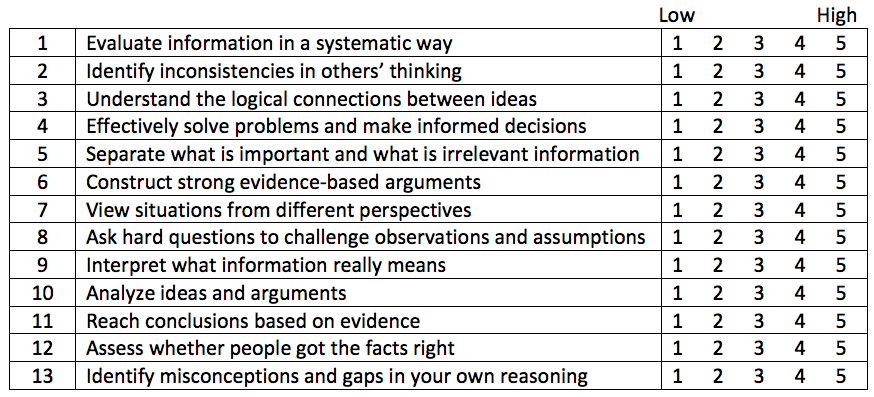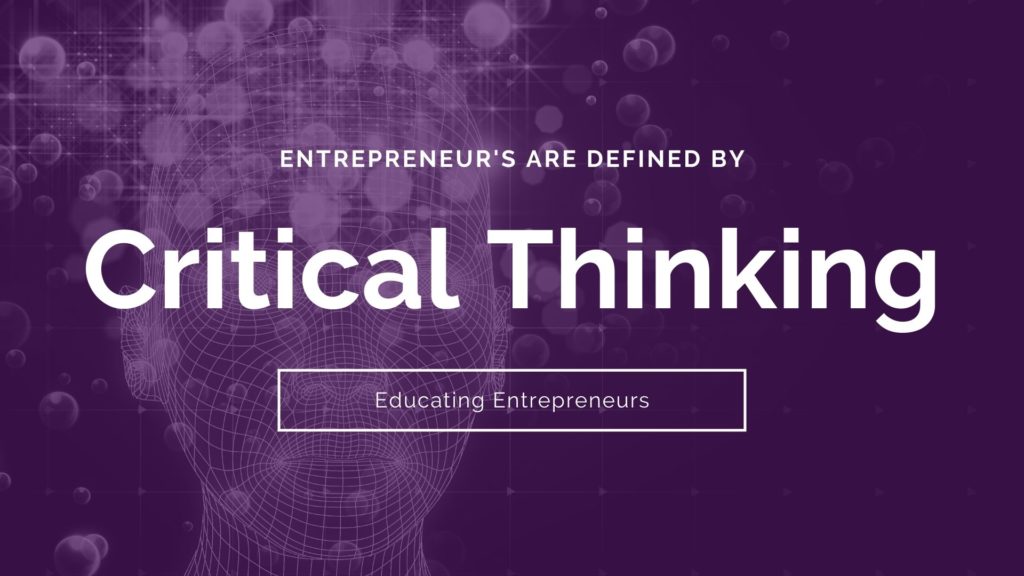“Hello. And welcome to your first day starting a business. I am your startup advisor Bobby Mason, and I am thrilled to have you join our team. I want to start by being straightforward with you… Most new and existing entrepreneurs are defined by their ability to be critical thinkers. Here’s why.
As an entrepreneur, you can be one of two individuals. You can either be the entrepreneur that impresses me by:
- evaluating information in a systematic way
- understanding the logical connections between ideas
- identifying inconsistencies in others’ thinking
- effectively solving problems and make informed decisions
- constructing strong evidence-based arguments
- viewing situations from different perspectives
- asking hard questions to challenge assumptions
Or you can be the entrepreneur that pisses me off. Sorry, maybe that’s a bit harsh on your first day. But I guess I shouldn’t sugarcoat it. If you are the entrepreneur that asks me for help when you run into any itty-bitty challenge or disagrees with my opinion without forming an evidence-based argument, I will throw you out as quick as I brought you in.
Why? Well, it’s simple. As your advisor, I am here to help you improve. I’m here to make you better. Therefore, if you come to me for help without doing any research or additional work before hand, me helping you solve that problem is essentially me completing that task for you. And you know what that means… If I have to do your job for you I might as well start your company on my own!
Cool?!? Great! Have a wonderful first day.”
Ask Yourself Questions.
To ensure that you don’t become the entrepreneur that pisses off your advisor or mentors, be sure that you are thinking critically, use the following accepted standards and questions to keep yourself focused on improving the quality of your reasoning and questions.
- Clarity: Can you elaborate on that point? Can you give an example of what you mean?
- Accuracy: How can you find out if this is true? How can you check that out?
- Precision: Can you be more specific or exact? Can you give more details on that point?
- Relevance: How does the point relate to the problem? How does the information help you?
- Depth: Why is the problem difficult or complex? What are some of the complexities of the issue?
- Breath: Do you need to consider other points of view? Do you need to look at the issue in other ways?
- Logic: Does this make sense? Does what you say fit with the evidence or information already given to you?
- Significance: Is this the most important problem to address? What is the central idea
- Fairness: Are you listening to the viewpoints of others? Do you have a conflict of interests?
Critical Thinking.
You want/should strive to become the greatest critical thinker your industry has ever seen. The greatest critical thinkers within a business setting typically engage in self-reflection and conduct a large amount of independent thinking. You can do this by using questions like the ones above to improve your critical thinking and enhance your ability to think outside the box. Questions like this force you to closely examine your beliefs, ideas, and arguments, helping clarify your pitfalls before presenting it to the people you “admire”. Most importantly, answering questions permits you to take your time. Instead of making a rash decision, a few simple queries can help refine your thoughts by synthesizing the information before moving forward with a decision.
Critical Thinking Assessment.
So, are you a critical thinker? Let’s find out! Be brutally honest with yourself so you can improve upon your shortcomings.

Critical Thinkers Are Important.
No matter how overexaggerated the opening scenario may have been, entrepreneurs with strong critical thinking skills are insanely valuable to their organization. They aren’t afraid to take risks because they accept that with risk comes mistakes, and with mistakes comes great opportunity to learn.
More importantly, critical thinkers enhance their company culture by bringing the following characteristics to the workplace:
- Creative: They see early patterns of thinking and behaviors surfacing, and tap innovative ideas and solutions that align with those behaviors.
- Curious: They are always interested in learning more about an idea, theory, or issue. They want to develop explanations that travel well beyond the surface level.
- Knowledgeable: They commonly offer an analysis and solutions based on their prior expertise or the information they were able to gather. Their arguments are typically rooted in thought out evidence.
- Open-minded: They listen to differing opinions and then accurately evaluate the strengths and weaknesses of that position. They rarely assume they have the right answers or jump to conclusions without recognizing the many shades of grey.
- Proactive: They initiate action when faced with a problem, and they use their strong thinking skills to find possible solutions.
Conclusion.
Here’s the good news, if you don’t fit the characteristics above it’s unlikely that you will fail at entrepreneurship on your first day. But I do highly encourage you to develop critical thinking skills. It may be the life hack you need to change your entrepreneurial career.
